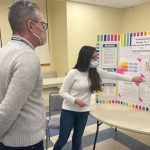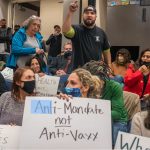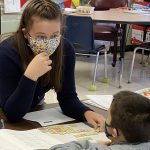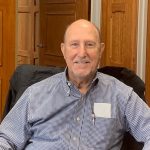Recently, UConn Today spoke with Eli Wolff, Neag School of Education Sport Management instructor and sport and human rights expert. Wolff offers his perspective on how and why athletes are being silenced, what they can do to combat this, and ultimately, what needs to shift to allow athletes to perform their job, but also exercise their right to free expression.
Congratulations to our Neag School alumni, faculty, staff, and students on their continued accomplishments inside and outside the classroom. If you have an accolade to share, we want to hear from you! Please send any news items and story ideas to neag-communications@uconn.edu. In addition to the Dean’s Office and Department achievements, explore this edition’s Accolades from the following: Faculty/Staff; Alumni; Students; as well as In Memoriam.
“As a former school board member – and as a researcher who studies educational leadership and policy – I find it worrisome when polarizing issues generate so much attention from candidates,” says Casey Cobb, Neag Professor of Educational Policy at the Neag School of Education. “The reason I worry is that I know from firsthand experience that being an effective school board member is never just about taking a stance on a few hot-button topics. Rather, it’s about much broader issues, such as meeting the educational needs of all students in the school district.”
Davidesco, an assistant professor in the Neag School of Education, is the recipient of an NSF Early Career Development (CAREER) Program award. This prestigious grant supports the research of early-career faculty who demonstrate remarkable potential to become leaders in their field. Additionally, the award seeks to support projects that actively engage students and the community.
“As a former school board member – and as a researcher who studies educational leadership and policy – I find it worrisome when polarizing issues generate so much attention from candidates,” says Casey Cobb, Neag Professor of Educational Policy at the Neag School of Education. “The reason I worry is that I know from firsthand experience that being an effective school board member is never just about taking a stance on a few hot-button topics. Rather, it’s about much broader issues, such as meeting the educational needs of all students in the school district.”
Students who are both academically talented and also on the autism spectrum can enjoy greater success in college based on the correct high school experience. That’s the finding of research performed by a UConn team in the Neag School of Education and published in a recent issue of the Journal of Autism and Developmental Disorders. The study used the largest sample of academically advanced students, who also have autism, in any research study ever conducted. The authors were interested in researching a group where the focus is typically on disabilities, not talent and abilities.
“School assignments that a student is expected to do outside of the regular school day—that’s homework,” says Sandra Chafouleas, a UConn Board of Trustees Distinguished Professor at the Neag School of Education. “The general guideline is 10 minutes of nightly homework per grade level beginning after kindergarten. This amounts to just a few minutes for younger elementary students to up to 2 hours for high school students.”
“School assignments that a student is expected to do outside of the regular school day—that’s homework,” says Sandra Chafouleas, a UConn Board of Trustees Distinguished Professor of Educational Psychology. “The general guideline is 10 minutes of nightly homework per grade level beginning after kindergarten. This amounts to just a few minutes for younger elementary students to up to 2 hours for high school students.”
Students who are both academically talented and also on the autism spectrum can enjoy greater success in college based on the correct high school experience. That’s the finding of research performed by a UConn team in the Neag School of Education and published in a recent issue of the Journal of Autism and Developmental Disorders.
William “Bill” Servedio, associate professor emeritus and a former dean of the Neag School, passed away on Monday, Dec. 27, 2021.






